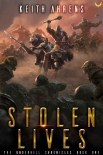War Girls (The Juniper Wars Book 5) by Aaron Ritchey (find a book to read TXT) 📗

- Author: Aaron Ritchey
Book online «War Girls (The Juniper Wars Book 5) by Aaron Ritchey (find a book to read TXT) 📗». Author Aaron Ritchey
The U.S. armies had pushed deeper into Colorado, reinforced by ARK mercenaries, the Cuius Regios, and the Severins. Only the last vestiges of June Mai Angel’s army were stopping them from marching into Denver and eradicating the Gammas, which was Hoyt’s plan.
Butcher all the hogs, bury the bodies deep, and pretend the ARK wasn’t toying with the human genome.
Those armies had disrupted all farming and ranching. People were forced to flee to the border. But the U.S wasn’t about to let Junies swamp their border cities.
It wasn’t long before we saw the fires of the refugee camp. The U.S. had built the electric fence, and the lights were far enough away from the EM field so they could still function. The camp, though, was prey to Juniper darkness. Close to the border the refugees had power. Farther away, you might get a flicker on your slates, but soon the Yellowstone EM field would kill the device dead. Go farther? All you got was darkness and fire.
I had to be careful. If the slate didn’t have the ARK shielding, which it prolly didn’t, it would get wiped clean and then my little tricks would be for naught.
We kept by the fence.
To the west, fires and sapropel lamps lit up a variety of tents. Some looked relatively new, but others were clearly salvage, missing poles, or full of holes. Some were even canvas, from some war or other, even from before the Sino. Other folks lived in hastily made cardboard shelters. To the east, those shanties were lit up by lamps connected to Eterna batteries. Rough women with tangled hair eyed us with dirty faces. Some held daughters to them, all thin and confused, prolly wondering what their options were. Catholic missionaries and New Morality charities kept them fed, but the stink of the place was another matter. What went into mouths had to come out the other end. Clusters of port-a-potties spotted the camp, but it was clear the people couldn’t use them anymore. The scatter of filth and foulness hurt.
The truth was, these weren’t people to the Americans. They were just Junies.
We approached a big fire where a dozen women found warmth. They were burning pallets that were marked as property of the United States Marine Corps.
I walked up to an old woman, missing an eye and most of her teeth. Ha, I knew her. It was Annabeth Burton’s aged mother. She’d outlived her kids, outlived everyone, and had run from a war.
“Hey, Ms. Burton,” I said.
Her eyes darted from me to Pilate, who stood tall, the only man in sight.
Ms. Burton let out a yell. “Cavvy Weller! And Father Pilate! Everybody! Everybody! It’s a Weller and their priest. Come ’round. Come ’round.”
She wrapped me up in a powerful stinky hug, and I hugged her back, and didn’t even think to correct her about my name. I did throw Pilate smirk. “Our priest.”
“The official Weller family priest.” Pilate smirked back.
Ms. Burton eased back but gripped my arms. “I heard about poor Annabeth. She was a good girl and a good daughter. I know’d you have done everything you could to keep her safe.”
Lost my sneering. Clamped down my jaws. Her death, even so long ago, felt strong. I remembered the bullets the night I first met Micaiah and Annabeth died. Remembered the howls of pain from the women and the dogs alike.
“We did, ma’am,” I said as even as I could. “She sure had a nice voice.”
“That my girl did. Now, let me hug the man!” Ms. Burton threw me aside to get to Pilate, who hugged her back and laughed.
“I’ve never heard a woman sing David Allen Coe better,” Pilate said about Annabeth.
Other women came forward, but the Widow Burton was the only face I recognized. “You really a Weller?”
“It ain’t Cavvy, but Wren,” another said. “She and Pilate were tight, and this one is thin. Cavatica was a bigger girl.”
I had been. Not anymore.
“You really Wren Weller?” another asked.
“Sure,” I said. Better I pretended to be my sister lest rumors of Cavatica inside the Juniper might get back to Hoyt. “I need a favor.”
But before I could talk about Hoyt’s slate, the stories started. Women told us that the first waves of refugees had made it through the fence, until the U.S. had to put a limit on who went in. Now they were giving out temporary visas to three families a day. But the people weren’t being taken into Hays. They were being sent on to Kansas City and St. Louis.
If you had immediate family who were American citizens, they’d let you cross, but you had to have mountains of proof. Even then, the closest cities couldn’t manage the swell.
“Way I heard it,” the Widow Burton said, “those cities are getting shantytowns bigger than out here. Only a matter of time before they close the borders. Some of us want into the U.S. Others are out here waiting out the war. We’re hoping in another few weeks, we’ll be able to go back to our farms and ranches. Yeah, we’ll have to rebuild, but we’ve had to do that before.”
“What about getting out of the Juniper and staying out?” I asked.
The Widow Burton smiled, and I saw nothing but gums. Her one good eye sparkled like noontime sunshine. “Oh child, and leave the beauty? Leave the wind? I could never. Outside they have computers and internets, but they don’t have what the Juniper has. They don’t have soul.”
I thought about what I had said to Pilate, about the ragged thing inside me fluttering about—as ragged as a bandana left in the dirt.
If my soul was so tattered, maybe the Juniper would lend me some of hers.
The Widow Burton gave me a saggy smile. “You mentioned a favor? What can I do you for?”
I pulled out Hoyt’s slate. “I need someone to take this back into the World and





Comments (0)